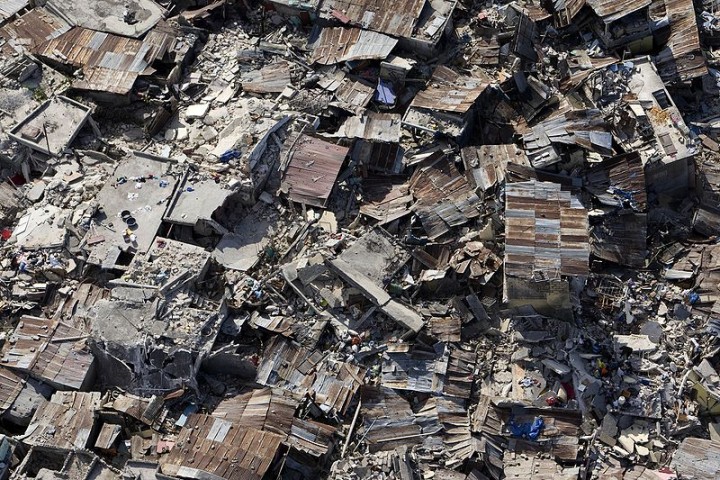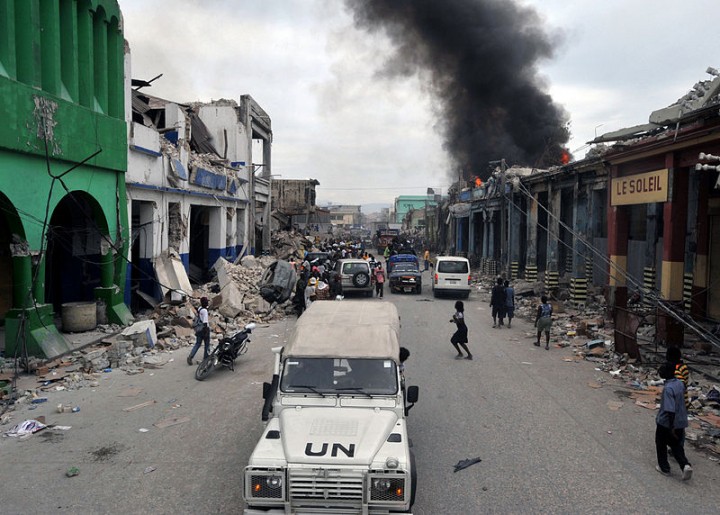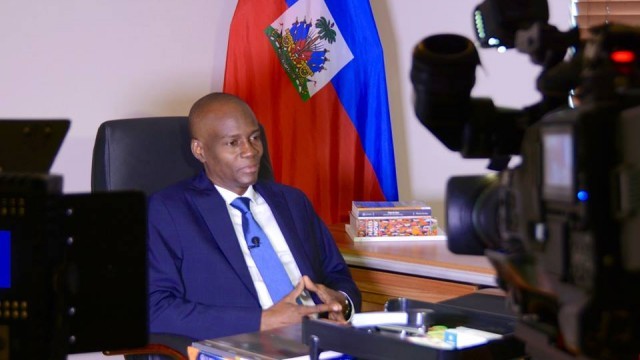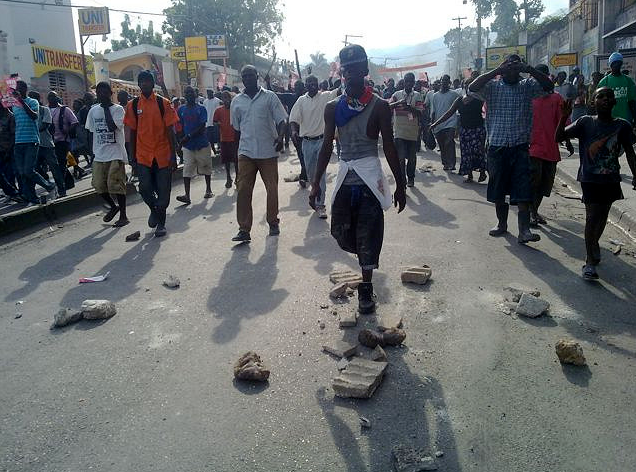Mass protests erupted last Friday (6 July) across Haiti to oppose the government’s plan to cut fuel subsidies. President Jovenel Moïse’s government at first appeared prepared to push ahead regardless of the protests, but with the demonstrations growing in size and scope, the government backed down on Saturday and announced a temporary suspension of the price hike.
There is zero confidence in the regime and an insurrectionary mood has gripped the country. The protests continued to grow over the weekend, eventually leading to calls for the resignation of the president and a general strike on Monday and Tuesday (9-10 July).
Domination of imperialism
Haiti has never really known economic or political stability since the great slave revolution of 1791 and independence in 1804. This historic instability is rooted in the country’s colonial past and the modern-day, crushing domination of imperialism. Haiti’s ruling class is extraordinarily weak, corrupt and incompetent. Despite the revolution and formal independence, Haiti’s capitalist class has long been utterly dependent on its imperialist masters and has proven itself completely incapable of developing the country economically, politically and socially.
In fact, the Haitian bourgeoisie has become so dependent on imperialism that it can only maintain its rule on the basis of direct economic, political and military support from the imperialist powers. This arrangement leaves the Haitian ruling elite in power and gives them access to the crumbs from the imperialists’ table. As for the imperialists, they have a free hand to exploit Haiti’s resources and cheap labour. As the imperialists control the purse strings, they exert considerable control over the country. The UN occupation force is tasked with enforcing this control.
The imperialists have historically used two main weapons to dominate and subjugate Haiti: debt and direct military occupation. Since the first Aristide government in the 1990s, the imperialists have exerted their control by tying loans and aid directly to the implementation of extensive privatisation plans; the creation of export-processing zones; the suppression of wages and trade unions; and ending fuel subsidies.

Since the collapse of the Duvalier regime, the imperialists have been primarily interested in finding a stable government in Haiti in order to protect their investments. But a stable government is impossible in Haiti. The bourgeoisie is too weak and the class struggle in Haiti too intense. This situation is only amplified by the developing crisis of world capitalism.
In Haiti, any government policies in favour of the interests of the ruling elite enrage the working class and poor, frequently resulting in mass protests with insurrectionary dimensions. However, any policies or reforms that favour the interests of the working class and poor, no matter how mild (such as raising the minimum wage, building more schools and hospitals and setting up literacy programmes), enrage the ruling elite and frequently lead to the rise of paramilitary action and coups. As we have seen multiple times in the past 30 years, in order to protect their interests (investments), the imperialists then use military occupation forces to “restore order”.
Combustible material
Haiti is the poorest country in the Western Hemisphere. Recent World Bank statistics show that more than 6m out of Haiti’s population of 10.4m (59 percent) live below the national poverty line of US$2.41 per day, while over 2.5m (24 percent) live below the national extreme poverty line of US$1.23 per day.
Gross National Income per capita is $1,730 (at Purchase Power Parity). In comparison, the average in the rest of the Caribbean/Latin America is $14,098. Just over 74 percent of the urban population live in slums. Over 75 percent of the rural population is poor, 50 percent of children do not attend school, resulting in a literacy rate of 61-64 percent for males and 57 percent for females. Fewer than half of Haitians in rural areas have access to water and only 24 percent of all Haitians have access to toilets (with most people making use of self-made latrines).
On top of this, Haiti is vulnerable to natural disasters, which frequently wreak havoc on the country. In 2010 a major earthquake hit Haiti, devastating the country and destroying the equivalent of 120 percent of the GDP. It is estimated that some 250,000 residences and 30,000 commercial buildings had collapsed or were severely damaged by the quake. Death toll estimates vary, but range from 100,000 to 300,000 dead in the disaster. Some 1.5m people were displaced as a result of the earthquake. To this day Haiti has not fully recovered and there are still tens-of-thousands of people living in temporary camps.

Haiti was still reeling from the earthquake when it was hit by Hurricane Matthew in 2016. The storm destroyed the equivalent of 22 percent of the GDP. Some 500-600 people were killed and hundreds-of-thousands required emergency shelter, with some 1.4m people requiring humanitarian assistance, compounding the problems still posed by the earthquake.
The revolutionary situation that was developing in the country during the second Aristide presidency in the early 2000s had been partially cut across by the UN occupation and the earthquake as the country was smashed: hundreds-of-thousands had died and people were forced to focus on simply surviving.
However, in 2013 the anger of the masses spilt out onto the streets as thousands protested the lack of progress of the earthquake recovery, the level of corruption, increases in the cost of living and delayed legislative and local elections.

The movement swelled again in 2015 until elections were held later that year. There was massive fraud in the presidential elections that year. For example, Jovenel Moïse, a banana exporter who helped establish an agricultural free-trade zone in Haiti, and a direct representative of imperialist interests in Haiti, officially received 32.8 percent of the votes in the first round of the 2015 presidential election, yet exit polls by the Haiti Sentinel showed he only received 6 percent.
The fraud in the elections sparked mass protests and the elections were again delayed. A commission set up to investigate the results found widespread fraud and recommended the elections be redone. It should be noted that organisations based in Haiti had found considerable evidence of fraud, yet international observers endorsed the results before the commission’s report had even been released. US imperialism had found their man in Moïses. After spending millions on the election, it wanted its preferred candidate in power, regardless of whether he actually won the election.
Adding fuel to the fire
The elections were eventually redone in November 2016 and Moïse officially won, again amidst accusations of fraud and mass protests. Since the revolutionary overthrow of the Duvalier regime in the 1980s, the Haitian bourgeoisie’s attempts at ruling ‘democratically’ have been a complete fiasco. Given the corruption, fraud, multiple coups and military occupations, it should come as no surprise that the Haitian people have very little confidence in ‘democracy’ in the country and less still that their vote matters.
Turnout in the 2000 election, which brought Aristide to power for the second time, was around 50 percent, mainly based on enthusiasm among workers and the poor for Aristide at the time. After the coup that overthrew Aristide, and the UN occupation, turnout fell to just below 40 percent in the 2006 election. Since then, turnout levels have collapsed from 22 percent in 2010/2011, to 28.8 percent in 2015, and just 18 percent in the November 2016 elections. This means that, of a population of 10m people, only around 600,000 voted for Moïse, who clearly would have no mandate if he didn’t win by means of fraud.

Moïse, proving himself the representative of imperialist interests in Haiti, assumed office in early February, and by the end of the month had signed an agreement for economic assistance from the IMF. The IMF deal would give the Haitian private sector access to $96m in loans in exchange for the complete privatisation of the state-owned energy company and the elimination of fuel and electricity subsidies.
The imperialists have long been trying to get rid of the fuel subsidies in Haiti. For some time, an automatic adjustment mechanism had been put in place to control spending on subsidies. This was designed by the imperialists and the local Haitian elite to cut spending as the price of fuel rose in the earlier part of this century.
In the face of the 2010 earthquake, the government was forced to abandon this automatic mechanism. With fuel prices frozen since March 2011, spending on subsidies increased as fuel prices began to slowly rise again after the crash in 2008. The World Bank estimates that by 2014, fuel subsidies amounted to 2.2 percent of Haiti’s GDP, outstripping spending on health, which is around 0.8 percent of GDP.
The argument that the imperialists are using is that, because the poor in Haiti use little fuel, the fuel subsidies disproportionately benefit the rich. The World Bank estimates that the richest 20 percent of the population receives 93 percent of fuel subsidies. While it is undoubtedly true that the rich disproportionately benefit from the fuel subsidy, this is no reason to eliminate it for everyone. It would be one thing to cancel the subsidy for the rich elite (and the elimination of the subsidy will also have less of an impact on the wealthy), but this is really about attacking the benefits of the Haitian poor and working class.
The imperialists further argue that the subsidies don’t leave the government any room to invest in social spending on health and education. The idea proposed by the imperialists is that if the fuel subsidies are eliminated, the government will have more money to invest in schools, clinics and hospitals.
But the imperialists aren’t fooling anyone. The situation bears a certain similarity to the gasolinazo in Mexico last year. Cuts to the fuel subsidy will directly and massively affect the lives of millions of poor Haitians. The majority of Haitians live in slums, with no gas or electricity connections. Only the rich elite enjoy such things. Most poor Haitians rely on gasoline, diesel and kerosene for lighting their homes and for cooking, not to mention getting to work, etc. Increases in the cost of fuel also push up the cost of transport, and thus of food and other goods. Cutting the fuel subsidy will also mean more children will be unable to attend school.
Despite the fact that the fuel subsidies disproportionately benefit the rich, the reality is that working-class and poor Haitians cannot survive without these subsidies. An increase in fuel prices will be disastrous for poor Haitians and they cannot tolerate any more impositions and attacks on living standards. The working and poor people of Haiti see the subsidies as one of the few benefits they have in life and rightly regard the elimination of the subsidies as an attack on their living and working conditions.

Besides, why would the working-class and poor of Haiti give up an immediate benefit in the form of the fuel subsidy in exchange for empty promises of increased social spending? Given the history of the country and the nature of the government, there is no reason to have any confidence that such promises will ever be carried out. Even if they are carried out, to whatever degree, it is inevitable that they would also disproportionately benefit the rich elite, as everything in Haiti does. The Haitian people have no reason to believe that any hospitals or schools will be built. Why trade fuel subsidies, which means access to fuel for transport, cooking and lighting, for something that will likely never happen?
In fact, there have already been several cuts to the subsidy and increases in prices over the past year. The government increased the price of fuel in May 2017. In October 2017, it re-implemented the automatic adjustment of fuel prices and signed an agreement with the unions to gradually eliminate the subsidy for public transport.
After the agreement signed in February 2018 with the IMF, the government announced a massive budget deficit and, together with the IMF and World Bank, largely blamed the deficit on the fuel and electricity subsidies. More recently, the Inter-American Development Bank offered more cash if the government would publicly commit to eliminating the fuel subsidy. Everyone knew the cuts to the fuel subsidy were coming and a series of protests had already been organised, where the struggle against the proposed hike in fuel cuts was connected in some areas with calls for the removal of foreign occupation forces and an increase in the minimum wage. Various political organisations and unions warned the government that if it went ahead with the cuts to fuel subsidies it would face a revolt.
Insurrection
At 4:00pm last Friday, while the country was busy watching the World Cup, the government announced its fuel subsidy cuts. The price of gasoline was set to rise by 38 percent, diesel by 47 percent and kerosene by 51 percent. This was the straw that broke the camel’s back. All the anger of the masses that has been building for years suddenly exploded into the open. Adding insult to injury, kerosene, which is set to rise the most, is the fuel source used most by the poorest of the population, again showing that this is about attacking the poor and the working class. Such price hikes for fuel would be difficult enough to deal with for people in the advanced capitalist countries, but in Haiti they will make life impossible for millions.
The masses’ response to the announcement was immediate – and massive. Mobilisations began in Port-au-Prince, but quickly spread across the island to other cities and areas such as Les Cayes, Cap-Haïtien, Jérémie, and Grand’Anse. Hundreds of barricades went up in Port-au-Prince as police attacked demonstrators, paralysing the capital. However, the police were quickly overwhelmed and retreated, and control of the streets fell to demonstrators.
Eventually, the transport, public sector and various rural and urban unions and organisations joined the demonstrations. Reports indicate that several union and other organizations came together to form a coordination committee for the protests, which will be key going forward. The committee called for a general strike on Monday and Tuesday (9 and 10 July). The demands of the strike included the permanent suspension of the cuts to the fuel subsidy, the reinstatement of workers fired from state-owned companies, the arrest of corrupt officials implicated in the theft of Petrocaribe funds and finally, calls were made for the president to resign.
Other reports give an indication of the insurrectionary nature of the mass movement that has erupted across the country. Significantly, as an indication of the acute anger of the masses, it has been reported that the size and scope of the movement appears to dwarf that which led to the fall of Duvalier dictatorship.
Fearing a revolutionary uprising, the government backed down somewhat and announced a temporary suspension of the fuel subsidy cuts on Saturday, in advance of the proposed strike dates.
Already, on the weekend, transport was completely shut down, all markets were closed and the media ceased broadcasting. When the general strike commenced on Monday the capital and most of the country was completely shut down. Businesses were closed and transport ground to a halt.
While news from Haiti is difficult to come by due to the strike and the intentional lack of reporting by most of the foreign media, the latest reports show that the strike continued and held strong on Tuesday. The transport unions joined the strike that day and the country remained frozen.
However, it seems that the government is trying to regain control of the situation. A demonstration in front of the National Palace that had been called for on Tuesday was attacked by the national police. It appears that UN forces, at least for the time being, have not intervened.
Revolution
The magnificent insurrectionary movement of the Haitian people has managed to stop the cuts to the fuel subsidy for now. However, the government suspension is only temporary. If the government survives, the imperialists will insist that the agreement signed in February be implemented. As they have done in the past, the imperialists will withhold the funds the government desperately needs in an attempt to starve the country until the subsidy cuts are implemented.
The government will come under enormous pressure from the imperialists and therefore the Haitian people can have no confidence in the government or the suspension of the subsidy cut. If the movement backs down or retreats in the face of the suspension, the government and the imperialists may bide their time, but at a certain point they will try to push through the cuts again.

It remains unclear how the situation will develop. The government is very weak, with no mandate or popular support. Faced with a popular revolt, it is entirely possible that the government will fall. If the workers and poor cannot take power, this opens up the possibility of some sort of coup as the ruling elite attempt to crush the movement of the masses and push through the IMF agreement. The imperialists also have the UN occupation force, which at a certain stage could intervene to help the ruling elite “restore order” until a new bourgeois government is installed, ultimately to ensure that the IMF deal is implemented. The Haitian people have been down this road many times before.
For the working-class and poor of Haiti, there is no way forward on the basis of capitalism. As long as the capitalists remain in power the country will remain utterly impoverished and at the mercy of the interests of the imperialist powers. The Haitian ruling class and the imperialists have proven totally unwilling and incapable of solving any of the problems the workers and poor face.
Only socialism offers a way forward for the Haitian people. The only way to permanently stop the cuts, protect the interests of the workers and poor, develop the economy and provide jobs is to remove the bourgeoisie and imperialists from power.
The interests of the Haitian working class and the ruling elite are mutually exclusive. The Haitian capitalists are parasites who profit from the ruthless exploitation of the Haitian people and the crumbs of imperialism. For this reason, the Haitian ruling elite cannot tolerate any reforms beneficial to the workers and poor as this hurts their profits and challenges their rule over the country. They have demonstrated this and their willingness to fight to the death to protect their wealth and power repeatedly throughout Haiti’s history. This is why, on the basis of capitalism, Haiti will never escape the nightmare of poverty and imperialist domination.
The working and poor masses of Haiti must take power themselves and form their own government that will rule in their interests. The workers and poor must call for expropriation of the ruling elite and the imperialists as well as for the removal of the UN occupation forces as the first steps necessary to this end, along with a call for revolutionary solidarity from the poor, workers and peasants of the Caribbean and all the Americas.

